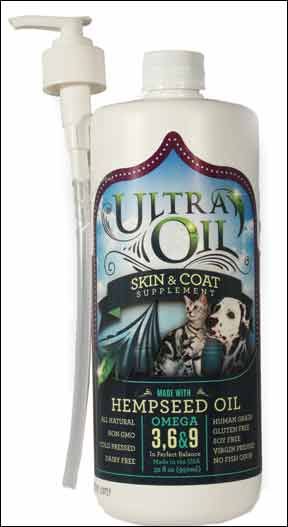There are many different types of plant oils that people use to supplement their dogs’ diets, including oils from flaxseed, olives, coconut, vegetables, hempseed, and more. Some of these oils can provide benefits, but others are not helpful and may even contribute to inflammation.
Plant oils provide primarily polyunsaturated fatty acids (PUFAs), which include omega-3 and omega-6 fatty acids. Fish oil is also mostly PUFAs. Some plant oils, such as olive oil, provide monounsaturated fatty acids (MUFAs). Coconut oil is an exception, as it is made up of saturated fats, which is why coconut oil is solid at room temperature (though it becomes liquid at 76 degrees Fahrenheit).
Omega-3 and omega-6 fatty acids are considered essential for dogs: they must be provided in the diet. The ratio between the two types is important, but recommendations for the “ideal” ratio vary. In the past, the recommended ratio of omega-6 to omega-3 has been as high as 20:1, but current guidelines generally range between 10:1 and 5:1, and sometimes even lower.
Omega-6 fatty acids are fairly stable, surviving storage without becoming rancid. Most diets, both commercial and homemade, contain ample omega-6 fatty acids, and there is rarely any need to add more. The exception is homemade diets that contain little poultry fat.
Omega-3 fatty acids, particularly those found in fish oil, are fragile and break down easily when exposed to light, heat, and air. For this reason, omega-3 fatty acids are usually lacking in most diets, even commercial diets with added omega-3 fatty acids, since they are not likely to survive packaging and storage.

288
Cold-pressed, unrefined oils are healthier than those subjected to heat processing and refinement, which destroy antioxidants and other beneficial properties. Hydrogenated and partially hydrogenated oils should never be fed.
Symptoms of fatty acid deficiency may include a dull, dry coat and skin, excessive shedding, seborrhea, and itching. These can also be signs of a fat imbalance, however. Different types of fatty acids compete for uptake within the body, so giving too much of one type can lead to deficiencies of another, even if adequate amounts are included in the diet.
BENEFITS: There are different types of both omega-3 and omega-6 fatty acids, some of which are more beneficial than others.
Most vegetable oils, such as corn oil and soybean oil, are high in linoleic acid (LA), the most common and plentiful omega-6 essential fatty acid. Significant amounts of LA are also found in poultry fat, but not in red meat.
Too much LA can contribute to inflammation, making conditions such as allergies and arthritis worse, so unless you feed a homemade diet that does not include poultry, you should not need to add LA to your dog’s diet.
Linoleic acid is converted in the body to other omega-6 fatty acids, including gamma-linolenic acid (GLA), a preferred form that is anti-inflammatory. Poor diet or certain health problems can interfere with this conversion, so supplementation with oils containing GLA can be beneficial for some dogs, including those with allergies, autoimmune disease, and seborrhea. Good sources of GLA include borage oil, evening primrose oil, black currant seed oil, and, to some extent, hempseed oil or ground hempseed, all of which also contain LA and other fats. A little GLA goes a long way, so these oils are often available in gelcap form or as part of oil blends.
Flaxseed oil is predominately alpha-linolenic acid (ALA), an omega-3 fatty acid that must be converted inside the body to EPA and DHA (the fatty acids found in fish) in order to be utilized. Dogs can’t do this conversion very well, so flaxseed oil provides limited benefits for most dogs, although it may help with dull, dry coat in some dogs. ALA can also be provided from ground flaxseed. Both ground flaxseed and flaxseed oil should be refrigerated in dark containers and used within a short period of time, maybe a month or two. Whole seeds will keep longer and are best if ground fresh daily or every few days.

288
Olive oil provides primarily oleic acid, an omega-9 non-essential MUFA. Pumpkin seed oil also has relatively high levels of oleic acid, and certain vegetable oils, such as safflower and sunflower oil, are available in “high oleic” versions (all of these also provide LA). Oleic acid has been shown to lower cholesterol and reduce the risk of heart disease in people, but dogs don’t have the same type of problems with cholesterol that people do, so benefits are likely to be less. Be sure to use only unrefined “virgin” oils, which preserve antioxidant compounds and plant phenols that may be the most important parts.
Coconut oil, unlike other plant oils, is a highly saturated fat. Some of the saturated fat in coconut oil is in the form of medium-chain triglycerides (MCTs), which may provide many of its benefits. MCTs are more easily digested than other fats and can be used to supply fat and calories, and to help prevent deficiency of fat-soluble vitamins, for dogs with fat intolerance.
Proponents claim a host of benefits from coconut oil, including reducing inflammation, improving digestion, reducing the risk of cancer, and preventing and treating infection. Use only virgin, unrefined coconut oil, preferably in glass bottles. Coconut oil should be white when solid and clear when liquid. (See “Crazy About Coconut Oil,” WDJ October 2005.)
CAUTIONS: Only fresh oils should be used; never feed oils that smell rancid or “off.” All oils are fats and provide about 40 calories per teaspoon, so amounts should be limited, particularly in overweight dogs and those already eating a high-fat diet. Too much fat can cause digestive upset and may even lead to pancreatitis in susceptible dogs. When adding oils, always start with small amounts and increase gradually. If you see any negative reaction, such as digestive upset, decreased appetite, or lethargy, stop the supplement.
Adding PUFAs to the diet increases the need for vitamin E, which helps to prevent oxidation within the body as well as without. Just 10 IUs of vitamin E should be enough to balance one teaspoon or 5 grams of oil. Many oil supplements contain vitamin E, but check the label to be sure. Vitamin E supplementation is especially important in homemade diets, where this vitamin is always low. High amounts of vitamin E are not necessary and may be counterproductive, so limit supplements to no more than 1 to 2 IUs per pound of body weight daily, or you can give higher amounts less often.
While grapes and raisins can cause kidney damage in dogs, no serious problems have been seen so far with grapeseed oil or extract, which are sometimes included in oil blends and other nutritional supplements. Grapeseed oil is predominantly LA. Grapeseed extract is a good source of antioxidants, but the oil is not. No plant oil can replace the need for fish oil (or fatty fish) in the diet.
DOSAGE: Because they add fat and calories, plant oils should be given in limited amounts, such as one to two teaspoons daily for a large dog, down to ¼ to ½ teaspoon for a toy breed. Coconut oil can be given in higher amounts, up to a maximum of one teaspoon per 10 pounds of body weight daily, split into multiple servings.
For homemade diets that don’t include poultry fat, which is found in the skin and dark meat, add about 1 teaspoon of walnut, hempseed, corn, or soybean oil, or two teaspoons ground hempseed, per pound of meat and other animal products.
Oil supplements may need to be given for one to three months before any improvement is seen.
RECOMMENDED SOURCES: Many fatty acid or omega oil blends are predominately vegetable oils supplying linoleic acid. Look for individual oils or blends that provide more beneficial fatty acids instead. While many oil blends tout their “ideal balance” of omega fatty acids, remember that balance must also take diet into account, where linoleic acid is generally high. Here are a few examples of oil blends:

288
– Vetri-Science Omega 3-6-9 (800-882-9993; vetriscience.com),a blend of borage seed, flaxseed, and fish oils.
– Ultra Oil Skin & Coat Supplement (317-845-7328; ultraoilforpets.com), a blend of hempseed, flaxseed, grape-seed, and fish oils.
– Udo’s Oil Blend and Pet
Essentials for Dogs (800-446-2110; florahealth.com), blends of flaxseed, sunflower, sesame, coconut, and evening primrose oils, along with other ingredients.
– Thorne Veterinary Omega PlusVET (800-228-1966; veterinary.thorne.com), a blend of fish and borage oils.
– NOW Foods Omega 3-6-9
(888-669-3663; nowfoods.com),a blend of flaxseed, evening primrose, canola, black currant,
and pumpkin seed oils.
Mary Straus is the owner of DogAware.com. She and her Norwich Terrier, Ella, live in the San Francisco Bay Area.







Hello, please may I ask a question? My dog eats Honest Kitchen dehydrated diet. Honest kitchen does also recommend oil to be added to the food. Confused on which one to chose. I’m concerned with fish oil could cause inflammation. I have been giving Nordic naturals. Would coconut or krill oil be a better choice. Please any information would be greatly appreciated. Thank you Deborah Hughes
Hi Deborah,
I’m not sure why you would think that fish oil would CAUSE inflammation. It’s used as an anti-inflammatory. It’s the one thing I would add. Nordic Naturals is fish oil. Krill oil has similar omega-3 fatty acids but is much more expensive. Coconut oil does not provide omega-3 fatty acids, and other benefits are questionable. More info:
http://dogaware.com/articles/suppsoils.html
My dog is allergic to seafood, including algal oil. He’s on raw grass fed meat, bones and organs. What would you recommend for him? Thanks
Nigel, I don’t know what to tell you. It is proteins that cause food allergies, so it’s unlikely your dog is allergic to algal oil, though he could have some other sort of problem with it. The diet you’re feeding is incomplete (unless you’re adding supplements that you didn’t mention), and may need other ingredients more than omega-3 oils. See these articles for more info on common problems with most raw diets:
https://www.whole-dog-journal.com/food/the-state-of-the-commercial-raw-diet-industry/
https://www.whole-dog-journal.com/food/why-all-dog-diets-should-meet-aafco-nutrient-guidelines/